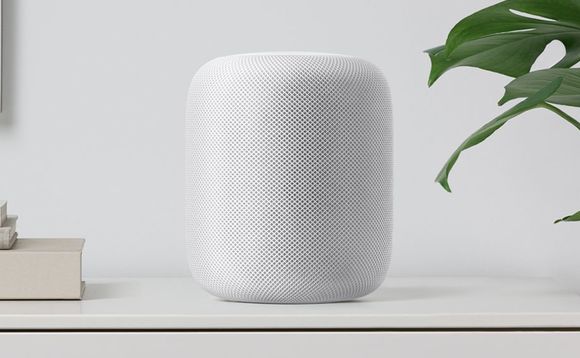Apple is taking on Google Home and the Amazon Echo with its Siri sporting HomePod smart speaker, revealed at its World Wide Developers Conference (WWDC) 2017.
Touted by Apple’s marketing guru Philip Schiller as the means to “reinvent how we enjoy music wirelessly throughout our homes”, the HomePod is a speaker system sitting under 7in tall with Apple’s virtual assistant Siri at it core.
Sporting a healthy hardware specification in the form of seven tweeters, a six microphone array, and Apple’s A8 mobile processor, the HomePod has the hardware guts to workout how to balance sound playback for the room it is in and carry out voice-controlled functions such as relay the weather forecast, set reminders, send messages and provide stocks and sports updates, all via Siri.
It also has a “Musicologist” feature for streaming Apple Music through commands barked at Siri, as well as being able to answer queries about the song playing, such as ‘who is the guitarist?’ and so on.
Apple HomePod
![]() Multiple HomePods can be networked together, but that will cost a pretty sum given each speaker costs $349 (£270). And prospective buyers will have to be content with the white and Space Grey colour options once the HomePod is released in December.
Multiple HomePods can be networked together, but that will cost a pretty sum given each speaker costs $349 (£270). And prospective buyers will have to be content with the white and Space Grey colour options once the HomePod is released in December.
Very much a device for consumer use, the HomePod is potentially an interesting prospect for software and online service developers, who are likely to be presented with another smart home device on which they could create apps for or more likely integrate their existing apps with.
However, Apple has a well-established reputation for keeping its app ecosystem and platforms under tight control, so developers hoping for more open smart home ecosystems such as Google Home with the Google Assistant and the Amazon Echo Show with Alexa, may be sorely disappointed.
Apple has also priced the HomePod much higher than rival devices, though the Cupertino company looks to be targeting music streaming speakers as well as Google and Amazon’s smart speakers, so the higher price has some justification.
We will have to wait until the tail end of 2017 to see if Apple’s HomePod will be a must have for homes and if its can steal back an early lead from its rivals.
Either way it appears that Apple is keen to push Siri above and beyond its rather sedate role in iOS 10 and on iPads and iPhones, and the HomePod is the first example of the company doing that.
How much do you know about AI? Take our quiz!





